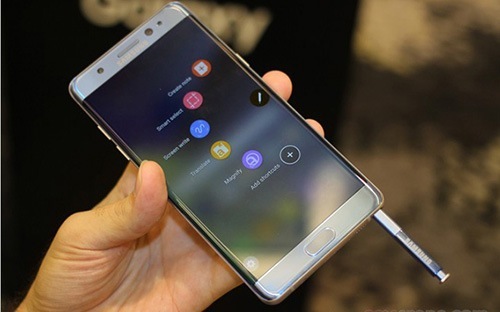Samsung requests tax exemption for recalled Galaxy Note 7 devices
 |
Vietnam-based Samsung Electronics Vietnam Thai Nguyen (SEVT) is one of facilities producing the faulty devices.
In a recent document submitted to the General Department of Vietnam Customs, SEVT said under the global recall and exchange scheme announced in early September, SEVT’s domestic branches and distributors will recall smart phones from end-users and then ship them to SEVT. The company will then send back new mobile phones with new IMEIs (International Mobile Equipment Identities) and serial numbers to customers.
According to SEVT, the reason for requesting the exemption is that the recalling and exchanging processes are considered under the brackets ‘temporary importing for re-export’ and ‘temporary export for re-import’, which currently do not incur taxes.
Earlier on September 2, the company suspended sales of the oversized products and recalled 2.5 million Note 7 devices that had been shipped worldwide after faulty batteries caused the phones to explode while charging.
Note 7 products were launched in Vietnam on August 19. According to domestic distributors’ statistics, over 10,000 Note 7 smart phones have been shipped to customers.
The recall has piled increasing pressure on the company, as the Federal Aviation Administration has officially banned passengers from turning on Note 7 devices on flights, while according to the regulation, passengers are recommended to put their mobile phones airplane mode on flights only.
Besides, Samsung has to suffer a serious damage for recalling 2.5 million Note 7 devices. Although the company would not reveal an exact figure, the cost likely stands at around $1 billion, based on Bloomberg’s estimates-a huge sum, especially, when only around 35 of the handsets (less than 0.1 per cent of the total volume sold) have been found faulty.
What the stars mean:
★ Poor ★ ★ Promising ★★★ Good ★★★★ Very good ★★★★★ Exceptional
Latest News
More News
- JustMarkets Launches Beginner-Friendly Trading Guide for New Investors (April 22, 2025 | 08:45)
- Chubb Names Janene Blizzard as New Head of Accident & Health for Asia Pacific (April 22, 2025 | 08:38)
- Wildberries Expands into Central Asia with Tajikistan Market Launch (April 22, 2025 | 08:00)
- MSIG Malaysia Pioneers Assisted Living Add-On for Personal Accident Insurance (April 22, 2025 | 08:00)
- Zoho Study: APAC Leads in Digital Transformation and Cybersecurity Readiness (April 22, 2025 | 08:00)
- World Internet Conference APAC Summit Debuts in Hong Kong, Spotlights Digital Intelligence (April 22, 2025 | 07:00)
- Taxes on super rich and tech giants stall under Trump (April 21, 2025 | 15:33)
- DHL to stop global shipments worth over $800 to US consumers (April 21, 2025 | 15:18)
- Ace Academia Welcomes Dr. Ban Har Yeap at 2025 Clementi Open House (April 21, 2025 | 09:51)
- VinFast Partners with Bengkel BOS to Grow Service Network in Indonesia (April 21, 2025 | 09:34)














 Mobile Version
Mobile Version